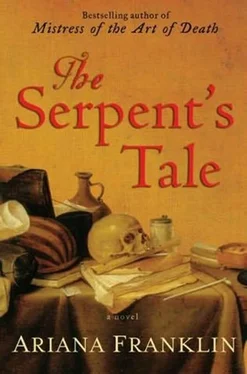But I have known love. I have my child, an occupation, friends.
Bertha, who had none of these things, clasped the cross and, bleating with pleasure, dived back into the straw with it.
As they walked back through the night, Jacques said, “Do you believe that little piggy can sniff out your truffle for you, mistress?”
“It’s a long shot,” Adelia admitted, “but Bertha’s nose is probably the best detector we have. If she should smell the old woman’s scent again, it will be on someone who buys foreign soap and can tell us who their supplier is, who, in turn, could provide us with a list of customers.”
“Clever.” The messenger’s voice was admiring.
After a while, he said, “Do you think the queen was involved?”
“Somebody wants us to think so.”
O n the rise above a gentle valley, a dog and four riders from Godstow reined in and considered the building and appurtenances crowning the opposite hill.
After some silence, Adelia said, unwisely, “How on earth do tradesmen penetrate it?”
“Gift of flowers and a nice smile used to do it in my day,” the bishop said.
She heard a snort from the two men on either side of her.
“I mean the labyrinth,” she said.
Rowley winked. “So do I.”
More snorts.
Oh, dear, sexual innuendo. Not that she could blame them. From here, the view of Wormhold Tower and what surrounded it looked, well, rude. A very high, thin tower capped by a close-fitting cupola-it even had a tiny walkway around its tip to accentuate the penile resemblance-rose from the ring of a labyrinth that men apparently saw as female pubic hair. It presented an outline that might have been scrawled on the top of its hill by a naughty, adolescent giant. A graffito against the skyline.
The bishop had led them here at a canter, afraid the weather might stop them, but now that the tower was in sight, anxiety had left him relieved and, obviously, with time to enjoy ribaldry.
Actually, it had been an easy journey northward, using the river towpath that ran from Godstow to within a half-mile of the tower. So easy, in fact, that Adelia had been invigorated by it and lost her own fear that the weather would hamper her return to her child.
Such bargemen as they’d encountered had warned them that more snow was on the way, but there was no sign of it. It was a cloudless day, and although the sun hadn’t melted the previous night’s fall, it had been impossible not to rejoice in a countryside like white washing spread out to dry against a laundered blue sky.
Farther south, on the river they’d just left, Mansur, the bishop’s two men-at-arms, and a couple of Godstow’s men were bringing up a barge on which to take the body of Rosamund back to the convent-once Bishop Rowley had retrieved it.
First, though, the labyrinth that surrounded the dead woman’s stronghold had to be got through-a prospect that was stimulating the old Adam in Adelia’s companions.
“I told you,” Rowley said, addressing Adelia but winking at Walt. “Didn’t I say it was the biggest chastity belt in Christendom?”
He was trying to provoke her. Ignore it. “I hadn’t thought it would be quite so large,” she said, and then sighed at herself. Another double entendre to make the men snigger.
Well, she hadn’t. The labyrinth at Saint Giorgio’s in Salerno was considered by the town to be a wonder, supposed to represent in length and complexity the soul’s journey through life. But this thing opposite her now was a colossus. It encircled the tower, forming a ring so thick that it took up a wide section of this side of the hill and disappeared behind it. Its outer wall was nine or ten feet high, while, at this distance, its interior seemed to be filled entirely by white wool.
The prioress of Godstow had warned her about it before she set out. “Blackthorn,” Sister Havis had told her with disgust. “Can you credit it? Walls of granite with blackthorn planted against them.”
What Adelia was looking at was stone and hedge, twisting and turning in frozen undulation.
Not a belt, Adelia thought. A snake, a huge, constricting serpent.
Walt said, “Reckon as that’s a bugger for its hedgers,” nearly causing Rowley to fall off his horse. Jacques was smiling broadly, happy at seeing his bishop unbend.
Sister Havis had said what Adelia could expect. The original labyrinth, she’d said, had been built round his keep by a mad Saxon necromancer and enlarged by his equally mad dispossessor, a Norman, one of the Conqueror’s knights, in order to stop his enemies from getting in and his women from getting out.
The Norman’s descendants had been dispossessed in their turn by Henry Plantagenet, who’d found it a convenient place in which to install his mistress, abutting, as it did, the forest of Woodstock, where he kept a hunting lodge.
“Architectural vulgarity,” Sister Havis had called it, angrily. “An object of male lewdness. Local people are in awe of it, even while they jeer at it. Poor Lady Rosamund. I fear the king found it amusing to put her there.”
“He would.” Adelia knew Henry Plantagenet’s sense of humor.
And Rowley’s.
“Of course I can penetrate it,” the bishop was saying now, in answer to a question from Jacques. “I’ve done it. A wiggle to the right, another to the left, and everybody’s happy.”
Listening to the laughter, Adelia began to be sorry for Rosamund. Had the woman minded living in a place that invited, almost demanded, salacious comment from every man who saw it?
Poor lady. Even dead, she was being shown little respect.
With snow resting on the walls and branches of the surrounding labyrinth, the tower looked to be rising from a mass of white fuzz. Adelia was irresistibly reminded of a patient, an elderly male whom her foster father was attending and on whose body he was instructing Adelia how to repair a hernia in the groin. Suddenly, much to his abashed surprise, the patient had sustained an erection.
That’s what’s scrawled against the sky, she thought, an old man’s last gasp.
She turned on Rowley. “How. Do. We. Get. In,” she said, clearly, “and try to remember there’s a dead woman in there.”
He jerked a thumb. “We ring the bell.”
Transfixed by the tower, she hadn’t noticed it, though it stood only a few yards away on the hillside, next to a horse trough.
Like everything else belonging to Wormhold, it was extraordinary, an eight-foot-high wooden trapezoid set into the ground, from which hung a bell as massive as any in a cathedral’s chimes.
“Go on, Jacques,” the bishop said. “Ding-dong.”
The messenger dismounted, walked up to the bell, and swung the rope hanging from its clapper.
Adelia clung to her mare as it skittered, and Walt snatched the reins of Jacques’s to prevent it from bolting. Birds erupted from the trees, a rookery fell to circling and cawing as the bell’s great baritone tolled across the valley. Even Ward, most unresponsive of mongrels, looked up and gave a bark.
The reverberations hung in the air and then settled into a silence.
Rowley swore. “Again,” he said. “Where’s Dakers? Is she deaf?”
“Must be,” Jacques said. “That would waken the dead.” He realized what he’d said. “Beg pardon, my lord.”
For a second time the great bell tolled, seeming to shake the earth. Again, nothing happened.
“Thought I saw someone,” Walt said, squinting against the sun.
So did Adelia-a black smudge on the tower’s walkway. But it had disappeared now.
“She’d answer to a bishop, should’ve worn my episcopal robes,” Rowley said. He was in hunting clothes. “Well, there’s nothing for it. We can find our own way through-I remember it perfectly.”
Читать дальше











